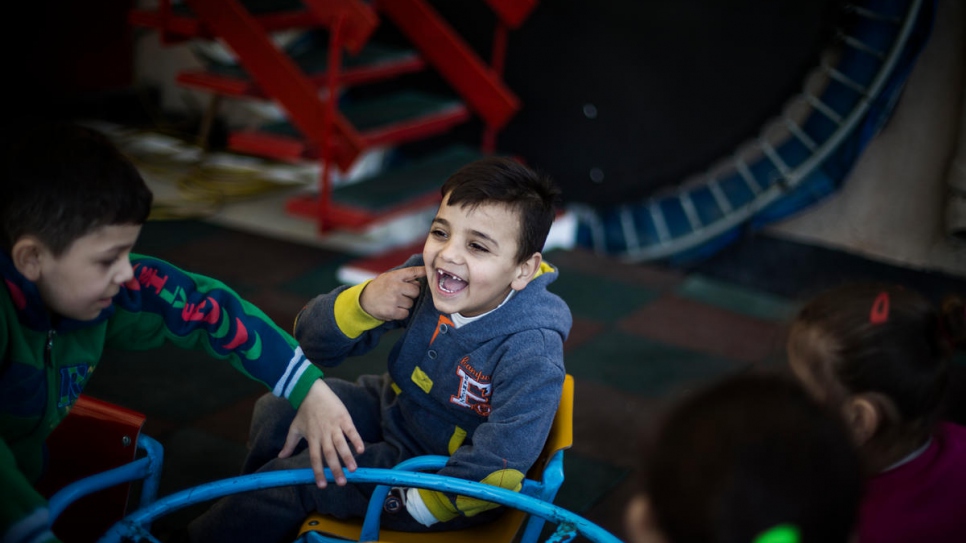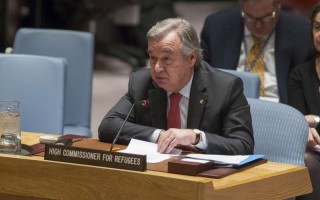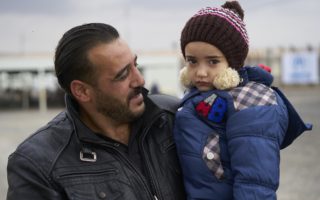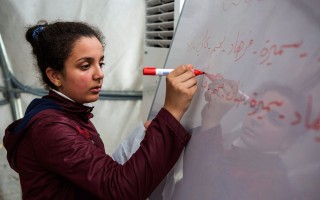
Mohammad, a young Syrian refugee from the ancient desert city of Palmyra, plays with classmates during a break at the Father Andeweg Institute for the Deaf (FAID) on the outskirts of Beirut in Lebanon. © UNHCR/Diego Ibarra Sánchez
By Rima Cherri and Charlie Dunmore in Beirut, Lebanon
Mohammad was barely two months old when war broke out in Syria. At first, life was much the same as before in the sleepy village near the ancient ruins of Palmyra, where his family lived. But before long the conflict would profoundly affect their lives, none more so than Mohammad’s.
Having never known anything but conflict at home and exile in Lebanon, where he and his family now live as refugees, Mohammad’s is just one story among millions affected by the war in Syria, which reaches a grim seven-year anniversary this month.
UNHCR, the UN Refugee Agency, estimates that there are now more than a million Syrian refugee children like Mohammad who have never known their country at peace, their earliest memories shaped by war and exile.
Mohammad’s father Hussein, 41, spent much of his son’s early life in neighbouring Lebanon, working occasional construction jobs to provide for the family, leaving his wife Aisha to run the household back home. “Back then our village was peaceful, and we could still dream of a better life for our kids,” he said.
Mohammad was diagnosed with a hearing impairment at the age of one-and-a-half and began wearing a hearing aid, visiting a specialist in Damascus for check-ups every three months. Soon after, beginning in 2013, the conflict that until now had raged in other parts of Syria gradually began to affect their lives.
“Armed groups would come and go – none of us knew who was fighting whom,” Hussein said. “At first you could still move around. Then people stopped travelling after dark, and after a while it became impossible to move at any time. People were too afraid to leave the village for any reason.”
“The house collapsed around us. I took my children and tried to get them away.”
It was due to this restricted movement that Hussein was stuck in Lebanon the night in August 2014 when the war finally reached their door and changed young Mohammad’s life forever. Around 2 a.m., Aisha, 32, was startled awake by the deafening sound of shelling.
“The house collapsed around us. I took my children and tried to get them away,” she recalled. “As we left, I saw my neighbours carrying dead bodies out of their house.” They made their way to nearby farmland to find shelter.
In the panic and confusion, it was only as dawn broke that Aisha noticed blood on her clothes, and realized it was Mohammad’s. The shrapnel wound in his left hand did not seem too serious at first, but because they were unable to reach a hospital for two days, nerve damage meant the doctors were forced to amputate.
After that, things did not improve. Armed groups took control of the area around their village in 2015 and prevented people from leaving. Mohammad was unable to visit the specialist in Damascus and his hearing rapidly deteriorated. With no other choice, in early 2016 Aisha paid smugglers to get her and her four kids out of extremist-held territory so they could join Hussein in Lebanon.
The journey via Raqqa, Aleppo, Damascus and finally on to Beirut took two months in total. At various points Aisha was forced to beg strangers for water, ride donkeys and walk for hours at a time with her four young children. “I took so many risks as a woman on my own, but I stayed strong,” she said. “I drew strength from those we met on the way who had overcome worse.”
Finally reunited with his family, Hussein’s first priority was to find specialist help for Mohammad’s hearing impairment. A tip off led him to the Father Andeweg Institute for the Deaf, a specialist school nestled in the leafy hills overlooking Beirut.
“Mohammad is a very smart student. He always wants to prove that he is just like everyone else.”
The school has 50 Lebanese students, as well as 20 Syrian refugee children who attend free of charge. As well as lessons in Arabic and English, the school provides hearing aids and access to speech therapists, psychologists and social workers.
After all Mohammad has been through, thanks to the school he is finally thriving. Each morning he tousles his hair in the mirror before the half hour ride to school, and the first thing he does on getting home is his homework. In class he wants to answer every question, eager to be the best.
“Mohammad is a very smart student,” said one of his teachers, Sabine. “He always wants to prove that he is just like everyone else, even if he doesn’t have a hand, that he can do everything.”
Hussein reflects on the fact that Syria’s war is as old as his fast-growing son. “The past seven years have taken us 100 years backwards. It made us grow old,” he said. “But I am not worried about Mohammad’s future. I am doing the best I can to make him happy, and somehow things always work out for him.”
His mother Aisha sums up the attitude that she says will come to define Mohammad’s future, despite everything that has happened in his past. “His determination has always been bigger than his disabilities.”
This story was originally published on unhcr.org.
Donate now to support Syrian refugees forced to flee this long and brutal war.





